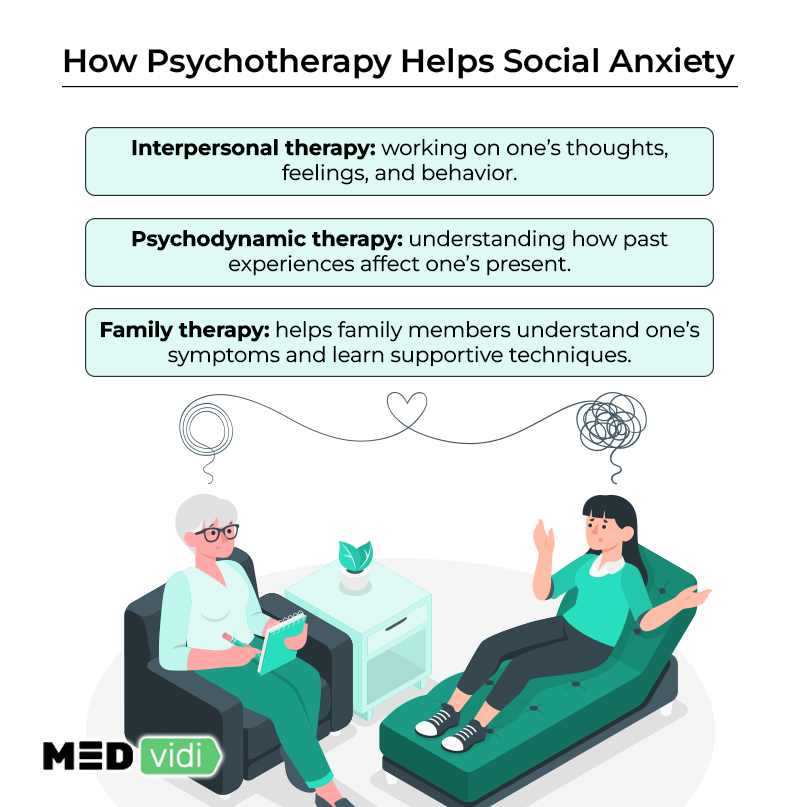If someone is slightly anxious when exposed to a social situation, such as meeting someone new or going to a party, it can be a normal thing. However, if one excessively dreads or panics because of usual situations like those mentioned above, it is likely to be a sign of a medical condition referred to as social anxiety disorder.
Even though this condition can only be diagnosed by a mental health professional, it is beneficial to know the details to notice worrying signs. Read on to learn more about the definition, cause, symptoms, prevalence, cure, and research into social anxiety in this article.
Your anxiety symptoms can be managed with the help of a mental health professional.
What Is Social Anxiety Disorder
According to the statistics from the Anxiety and Depression Association of America,
Social anxiety can cause extreme
The Diagnostic and Statistical Manual of Mental Disorders (DSM-5) describes two types of social phobias: generalized social anxiety (fear of all social situations) and specific social anxiety (fear of specific situations).
What Causes Social Anxiety?
Here are some of the most common causes of social anxiety disorder:
- Environmental factors. Several
environmental factors[3] may play a role in the development of social anxiety disorder. For example, an individual may have experienced bullying or harassment during childhood that causes them to feel uncomfortable around others. Negativity can damage their psychology, leading to feelings of low self-esteem and social anxiety. - Interpretation of the brain. Amygdala is a part of the brain that regulates emotions and social cognitive processes. It’s also linked to the fight-or-flight response—when people see something or someone who might be a threat, it triggers a release of adrenaline and cortisol to prepare to fight or flee. People with
overactive amygdala[4] find it more difficult to control their fear response, which may lead to social anxiety. - Genetics. Genetics play a role in the development of a social phobia too. People who have a family history of anxiety disorders, including social anxiety disorder, tend to develop it themselves at higher rates than those without such a family history.
Identifying the root cause of your anxiety is a huge step towards relief. Connect with a therapist today.
Social Anxiety Disorder: Symptoms
Some of the common symptoms of a social anxiety disorder include:
1. Emotional, behavioral, and cognitive symptoms
- Fear of embarrassment
- Shyness
- Becoming overly anxious around others
- Anxiety when meeting new people, going to social events or parties, and talking to others in general
- Avoiding other people
- Feeling embarrassed or ashamed after making a mistake in front of others
- Feeling self-conscious when speaking with other people
- Thinking they are being watched, judged, or evaluated all the time (hypervigilance)
- Withdrawing from social activities that were once enjoyable because they are now too stressful
- Having a fear of being in places where other people are present
2. Physical Symptoms
The physical signs of social anxiety disorder are:
- Blushing
- Sweating
- Rapid heartbeat
- Trembling
- Muscle tension
- Stomach pain and nausea
- Dizziness or lightheadedness
- Dry mouth and throat, difficulty swallowing, or lump in the throat (globus sensation)
- Feeling of unreality (derealization) or being detached from oneself (depersonalization)
- Fear of losing control or behaving in a way that will be embarrassing or humiliating
Your symptoms may be overwhelming, and we know how to help you manage them.

Social Anxiety Disorder Treatment
Common
1. Psychotherapy
Psychotherapy focuses on helping the person identify and change their thoughts, feelings, and behavior. Patients can get the therapy one-on-one or in a group setting. Psychotherapy teaches them how to cope with the symptoms more effectively. It may include learning relaxation techniques for social phobia or managing stress.
This approach may also involve
The goal is for patients to see themselves less as victims of circumstance vs. active agents in making life choices. Some of the best forms of psychotherapy, apart from CBT, include:
- Interpersonal therapy focuses on helping clients understand how their thoughts, feelings, and behaviors interact.
- Psychodynamic therapy focuses on helping clients understand how past experiences affect their current behavior.
- Family therapy helps family members understand how they can help each other cope with the symptoms of a mental disorder.
2. Medication
Several medications are used for social anxiety disorder treatment, but a patient must undergo a social anxiety disorder test first. These can help patients manage their symptoms and feel more comfortable at work, school, or other social situations.
The doctor will decide whether medication is the right choice after discussing the risks and benefits of each treatment option, such as:
- Anti-anxiety medications like Xanax or Klonopin may reduce patients’ anxiety symptoms In severe cases. However, they can cause severe side effects when combined with alcohol or other drugs.
- Antidepressants are another option. However, it can take several weeks or months before they start working effectively enough to make a difference.
- Beta-blockers may be prescribed for people with panic attacks and anxiety disorders like social anxiety.
Conclusion
Social anxiety disorder can be debilitating for those suffering from it, but with the proper treatment, people can recover and overcome this condition. It is crucial that anyone who suspects they might have a social anxiety disorder consult their doctor and receive proper support and help. Once a patient gets a diagnosis, they can use various types of treatment to control their symptoms so they can live normally.













